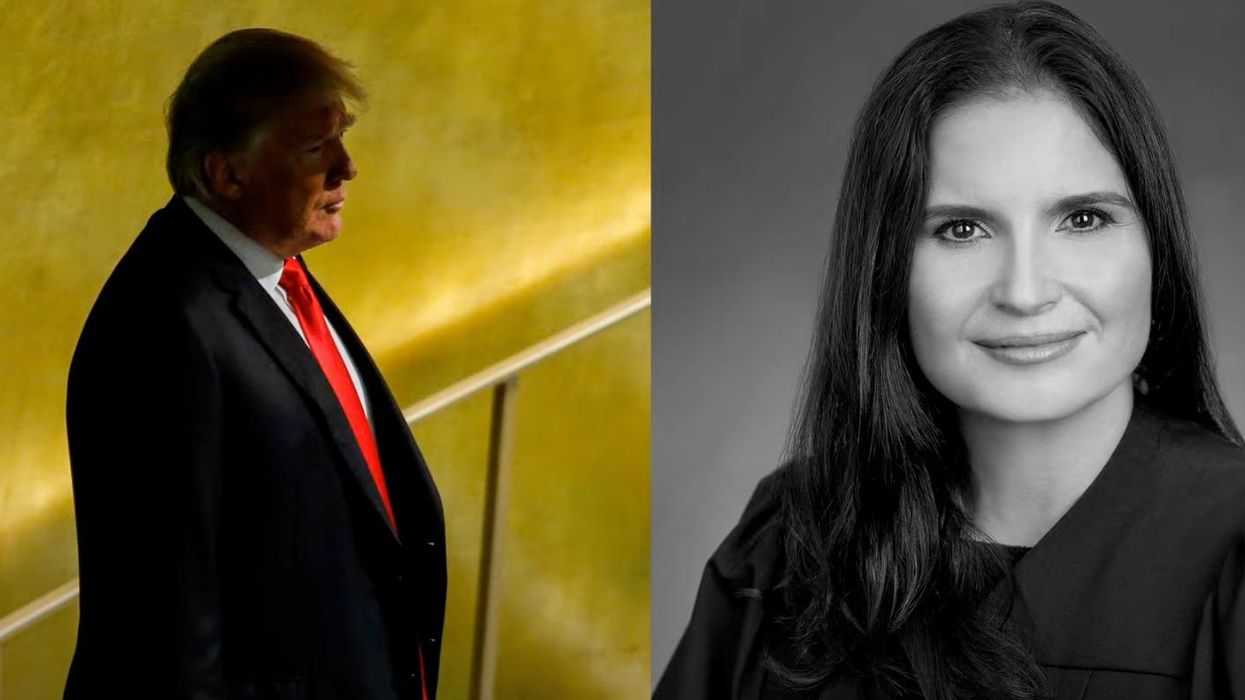Upholding Justice Department, 11th Circuit Panel Spanks Cannon Hard

Donald Trump, left, and Judge Aileen Cannon
Only 48 hours after the Trump legal team filed its response to the Justice Department’s request that the 11th Circuit Court of Appeals end the restrictions imposed on the 100 folders of highly classified documents, that appeals court -- citing legal precedent after precedent after precedent -- eviscerated the order handed down by Florida District Court Judge Aileen Cannon and ruled in the government’s favor.
In a scorching decision, the panel of three judges – two appointed by Trump and one by Obama -- found that Cannon erred on nearly every point of the law and procedure. The circuit court ordered that her restriction on the DOJ’s use of the classified documents is “stayed,” or lifted, as well as her requirement that “the government…submit the classified documents to the special master for review.”
The legalese is a bit dense, but that sounds an awful lot to me like the circuit court has told the DOJ that it does not have to submit the classified documents seized from Mar a Lago to the special master for review. That part of Cannon’s order is now moot, and the special master will not have to ensure that everyone reviewing the documents has a security clearance high enough to do so.
The circuit court appeared to rely heavily on the government’s “need to know” rules about classified documents, that anyone seeking to see, or even hold onto classified documents must not only have an appropriate security clearance but must establish a “need to know” in order to have the documents. The circuit court found that Trump had “no possessory interest” in the documents because their classified markings clearly show they belong to the government.
“For our part,” the court wrote, “we cannot discern why Plaintiff would have an individual interest in or need for any of the one-hundred documents with classification markings.”
The court went on to complete its cancellation of Trump’s legal arguments by noting, “Plaintiff [Trump] has not even attempted to show that he has a need to know the information contained in the classified documents. Nor has he established that the current administration has waived that requirement for these documents. And even if he had, that, in and of itself, would not explain why Plaintiff has an individual interest in the documents.”
KAPOW!
Further, the court takes apart Trump’s continued insistence that he had somehow declassified the documents at some unspecified point in the past: “Plaintiff suggests that he may have declassified these documents when he was President. But the record contains no evidence that any of these records were declassified. And before the special master, Plaintiff resisted providing any evidence that he had declassified any of these documents.”
BAM!
That’s where demanding a special master got him, and that’s where allowing his team to request Judge Raymond Dearie to serve in that capacity ended him up.
The circuit court went on to consider Trump’s argument, endorsed by Judge Cannon, that he would suffer irreparable harm due to “the threat of future prosecution and the serious, often indelible stigma associated therewith.” Disposing of that fiction, the court quoted a precedent that noted “if the mere threat of prosecution were allowed to constitute irreparable harm . . . every potential defendant could point to the same harm and invoke the equitable powers of the district court.”
BOOM!
As if all that were not enough, the Circuit Court spends about three pages enumerating all the procedures involved in the classification of documents and the rules necessary to protect them from exposure to forces hostile to the national security of the United States.
“We are not persuaded,” the court wrote, with the arguments made by Judge Cannon that a national security review of the classified documents could continue while restrictions remained on the DOJ and FBI. Endorsing the government’s argument to the contrary, the court continued, “The United States explains that there are circumstances where its national-security assessment of the classified materials is inextricably intertwined with the criminal investigation…thus, an injunction delaying (or perhaps preventing) the United States’s criminal investigation from using classified materials risks imposing real and significant harm on the United States and the public.”
THUMP!
Finally, the circuit court took on Judge Cannon’s order that the special master should review the classified documents for possible protection under executive privilege. “The United States also argues that allowing the special master and Plaintiff’s counsel to examine the classified records would separately impose irreparable harm. We agree,” the court states plainly. Pointing Cannon to a precedent whose importance she should have recognized, the court went on to say, “The Supreme Court has recognized that for reasons ‘too obvious to call for enlarged discussion, the protection of classified information must be committed to the broad discretion of the agency responsible, and this must include broad discretion to determine who may have access to it.’”
ZANG!
The whipped cream on the pie the circuit court launches into the face and reputation of Cannon is found in the final two pages of its decision and is worth quoting in full here. Analyzing whether Trump would be “substantially injured” by lifting the restrictions on the classified documents imposed by Judge Cannon, the court concludes:
First, as we have explained, Plaintiff does not have a possessory interest in the documents at issue, so he does not suffer a cognizable harm if the United States reviews documents he neither owns nor has a personal interest in.
Second, we find unpersuasive Plaintiff’s insistence that he would be harmed by a criminal investigation. “Bearing the discomfiture and cost of a prosecution for crime even by an innocent person is one of the painful obligations of citizenship.” Cobbledick v. United States, 309 U.S. 323, 325 (1940).
Third, because of the nature of the classified materials at issue here and based on the record, we have no reason to expect that the United States’s use of these records imposes the risk of disclosure to the United States of Plaintiff’s privileged information.
THWACK!
The 11th Circuit Court of Appeals punishing rejection of both Cannon’s order and Donald Trump’s legal reasoning is complete.
Lucian K. Truscott IV, a graduate of West Point, has had a 50-year career as a journalist, novelist, and screenwriter. He has covered Watergate, the Stonewall riots, and wars in Lebanon, Iraq, and Afghanistan. He is also the author of five bestselling novels. You can subscribe to his daily columns at luciantruscott.substack.com and follow him on Twitter @LucianKTruscott and on Facebook at Lucian K. Truscott IV.
Reprinted with permission from Lucian Truscott Newsletter
- Upholding National Security, Justice Serves Notice On Trump's Judge ›
- Justice Department Urges Appeals Court To Overturn Cannon Orders Entirely - National Memo ›
- Danziger Draws - National Memo ›
- Trump In Legal Jeopardy As Garland Appoints Respected Special Counsel - National Memo ›








